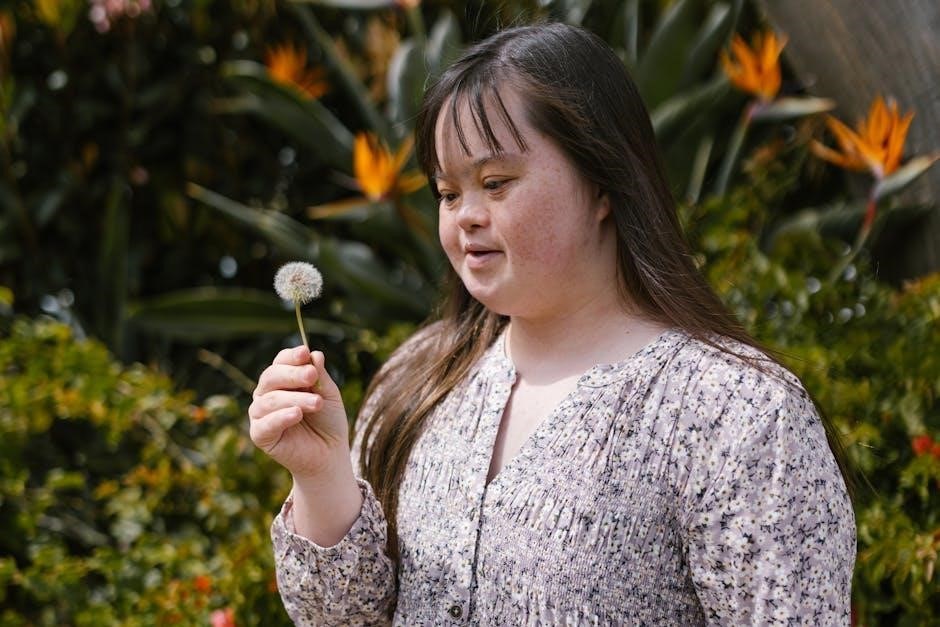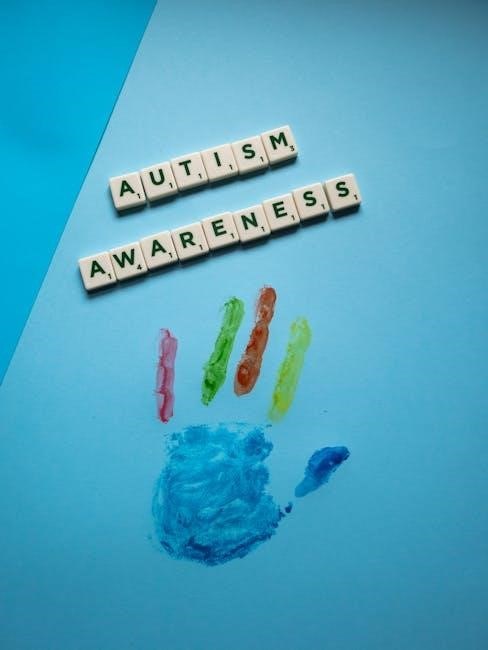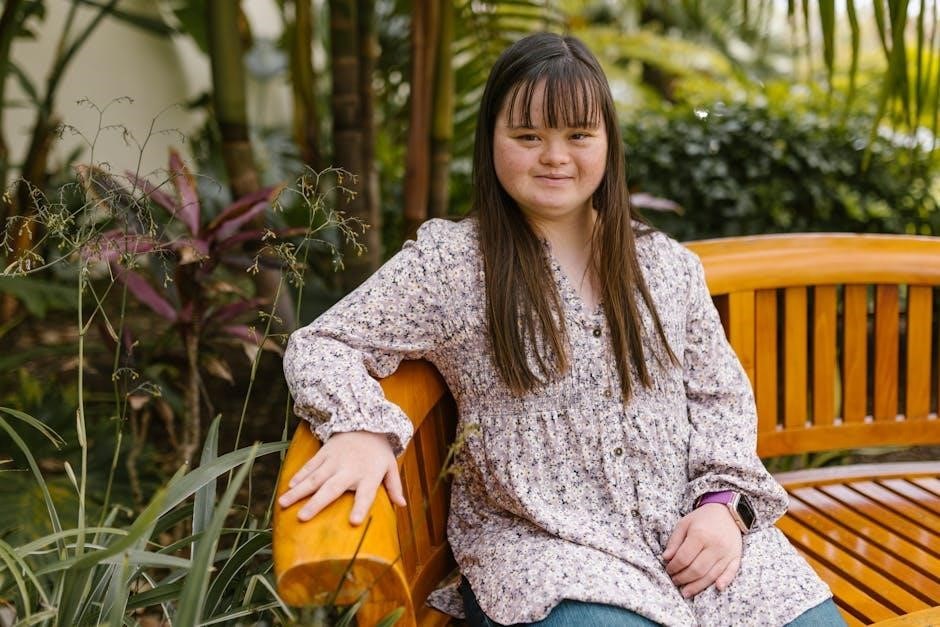
Life skills are essential for individuals with Autism Spectrum Disorder (ASD) to navigate daily tasks and achieve independence. These skills, such as communication, self-care, and problem-solving, are critical for enhancing quality of life. Resources like “Autism Life Skills: From Communication and Safety to Self-Esteem and More” and functional life skills checklists provide guidance. PDF materials and structured programs offer practical strategies for teaching and mastering these skills, addressing individualized needs and fostering confidence.
1.1 Definition and Role of Life Skills in Autism
Life skills for autism encompass essential abilities necessary for daily living, social interactions, and adaptive behaviors. These skills, such as communication, self-care, and problem-solving, are vital for fostering independence and confidence. They address core challenges like anxiety and sensory sensitivities, enabling individuals with autism to navigate everyday tasks effectively. Life skills are foundational for overcoming developmental barriers and enhancing overall quality of life.
Importance of Life Skills for Individuals with Autism
Life skills are crucial for individuals with autism, enhancing independence, mental health, and quality of life. They help reduce anxiety and sensory challenges, fostering confidence and self-esteem.
2.1 Connection Between Life Skills and Cognitive Abilities
Life skills development is closely linked to cognitive abilities, enabling individuals with autism to master daily tasks and problem-solving. Higher cognitive functioning often facilitates learning, but challenges like sensory sensitivities and executive functioning can hinder progress. Targeted strategies are essential to bridge gaps and promote independence, ensuring individuals can apply their cognitive strengths effectively in real-world situations.
2.2 Impact of Life Skills on Mental Health
Mastering life skills significantly improves mental health for individuals with autism by reducing anxiety and stress. Independent living skills, such as self-care and time management, foster self-esteem and confidence. These skills also mitigate depression and social anxiety, helping individuals cope with life’s challenges more effectively. Research highlights the importance of functional skills in promoting emotional well-being and overall mental health.

Categories of Life Skills
Life skills for autism are categorized into daily living and social-adaptive skills. Daily living skills include self-care and practical tasks, while social-adaptive skills focus on communication and interaction.
3.1 Daily Living Skills
Daily living skills are crucial for independence, covering tasks like personal hygiene, cooking, and money management. These skills help individuals with autism navigate everyday challenges. Resources such as structured programs and PDF guides provide strategies for teaching these skills, often using visual supports and step-by-step approaches to ensure mastery. These tools are essential for fostering self-reliance and confidence in daily routines.
3.2 Social and Adaptive Skills
Social and adaptive skills are vital for individuals with autism to interact effectively and adapt to various environments. These skills include communication, social reciprocity, and flexibility in routines. Resources like PDF guides and specialized programs offer strategies to enhance these abilities, addressing challenges such as anxiety and sensory issues. These tools help individuals build meaningful relationships and cope with life’s uncertainties more effectively.

Teaching Life Skills to Individuals with Autism
Effective strategies for teaching life skills to individuals with autism include ABA therapy, visual supports, and structured programs. These methods enhance independence and daily functioning, addressing unique needs.
4.1 Effective Strategies for Teaching
Effective strategies for teaching life skills include Applied Behavior Analysis (ABA) therapy, visual supports, and structured programs. ABA focuses on breaking skills into manageable steps, while visual aids like schedules enhance understanding; Parental involvement and real-life practice also boost learning. These methods address individual needs, fostering independence in areas like cooking, personal care, and safety, leading to increased confidence and self-reliance in daily tasks.
4.2 Role of ABA Therapy
ABA (Applied Behavior Analysis) therapy plays a pivotal role in teaching life skills to individuals with autism. By breaking skills into smaller, manageable steps, ABA helps individuals master tasks like cooking and personal care. Its systematic, data-driven approach ensures progress is tracked and tailored to individual needs. Positive reinforcement encourages desired behaviors, making ABA a highly effective tool for fostering independence and practical life skills.
4.3 Use of Visual Supports
Visual supports, such as schedules, choice boards, and social stories, are invaluable for teaching life skills to individuals with autism. They provide clarity and structure, reducing anxiety and aiding transitions. These tools help individuals understand expectations and tasks, fostering independence. Personalized visual aids can be adapted to suit individual needs, making them an essential component of effective skill development strategies.

Challenges in Learning Life Skills
Individuals with autism often face challenges like cognitive delays, sensory sensitivities, and social difficulties, hindering life skills acquisition. These barriers require tailored strategies to overcome.
5.1 Common Difficulties Faced
Individuals with autism often experience challenges such as sensory sensitivities, social reciprocity issues, and executive function deficits. These difficulties can hinder daily living skills, like self-care and meal preparation. Additionally, anxiety in new environments and struggles with task sequencing are common, requiring tailored strategies to address these obstacles effectively and promote independence.
5.2 Anxiety and Sensory Issues
Anxiety and sensory sensitivities are prevalent among individuals with autism, often complicating life skills development. Environmental triggers can cause distress, impacting task focus and routine adherence. Strategies like sensory integration techniques and anxiety reduction methods are crucial to mitigate these challenges, ensuring a supportive environment for skill acquisition and overall well-being.
Resources for Teaching Life Skills
Recommended books, checklists, and apps provide practical tools for teaching life skills. Resources like “Autism Life Skills” and functional skills checklists offer structured guidance for effective learning.
6.1 Recommended Books and Checklists
Books like “Autism Life Skills: From Communication and Safety to Self-Esteem and More” offer comprehensive guides for teaching essential skills. TACA’s Functional Life Skills Checklist provides a structured framework for identifying and developing critical abilities. These resources cater to diverse needs, ensuring personalized growth and independence for individuals with autism. They are invaluable tools for parents, educators, and caregivers seeking practical strategies.
6.2 Helpful Apps and Digital Tools
Apps like NFlyte and specialized digital platforms offer tailored support for autism life skills. These tools provide task management, social stories, and video tutorials, aiding in daily routines. They cater to diverse needs, enhancing independence and confidence. Such technology is invaluable for both children and adults, promoting skill development in a structured and accessible manner.

Employment Skills for Autistic Individuals
Employment skills empower autistic individuals to thrive in the workforce, fostering independence and confidence. These skills include communication, task management, and problem-solving, tailored to workplace environments.
7.1 Life Skill Prerequisites for Employment
Life skills are foundational for autistic individuals entering the workforce. Essential prerequisites include communication, problem-solving, and time management. These skills, often developed through structured programs, enhance workplace adaptability. Resources like “Functional Life Skills Checklists” and specialized training programs help individuals master tasks such as following routines, managing transitions, and maintaining a safe work environment.
7.2 On-the-Job Training and Support
On-the-job training is crucial for autistic individuals, providing practical experience and tailored support. Programs like NFlyte’s life skills app and initiatives such as The Hub café offer hands-on experience. Employers often use visual aids and ABA therapy principles to facilitate learning. Collaboration with organizations ensures customized support, fostering confidence and workplace readiness while addressing sensory and anxiety challenges common in employment settings.

Independent Living Skills
Independent living skills are vital for individuals with autism to manage daily tasks like cooking, cleaning, and budgeting. Resources such as TACA’s Functional Life Skills Checklist and structured programs provide guidance, ensuring a comprehensive approach to fostering self-sufficiency and confidence in everyday life.
8.1 Essential Skills for Independent Living
Essential skills for independent living include cooking, cleaning, and managing finances. These tasks are fundamental for self-sufficiency. Resources like TACA’s Functional Life Skills Checklist provide a structured approach, ensuring individuals with autism can master daily routines. PDF guides and structured programs offer practical strategies, fostering confidence and autonomy in managing everyday responsibilities effectively.
8.2 Support Systems for Independent Living
Support systems are crucial for fostering independence in autistic individuals. Trained parents, caregivers, and ABA therapists play key roles. Community initiatives and centers provide structured environments for skill development. Digital tools, like NFlyte, offer daily living management. Collaboration between these systems ensures a comprehensive support network, empowering individuals to thrive independently and confidently in their daily lives.

Health and Wellness for Autistic Individuals
Health and wellness are vital for autistic individuals, focusing on nutrition, physical exercise, and mental well-being. These practices enhance daily functioning, physical health, and emotional stability, promoting a balanced lifestyle.
9.1 Importance of Nutrition
Nutrition plays a crucial role in the health and well-being of autistic individuals, impacting energy levels, behavior, and cognitive function. A balanced diet rich in essential nutrients supports physical and mental health, while addressing sensory sensitivities and dietary needs. Proper meal planning and healthy eating habits help individuals with autism maintain a stable and thriving lifestyle, contributing to overall wellness and quality of life.
9.2 Role of Physical Exercise
Physical exercise is vital for individuals with autism, enhancing motor skills, coordination, and overall physical health; It also reduces anxiety, improves focus, and boosts mood. Activities like swimming, cycling, or structured fitness programs can be tailored to individual needs, promoting independence and confidence. Regular exercise fosters a healthy lifestyle, supporting both physical and mental well-being, and is a key component of life skills development for autistic individuals.

Technology Tools for Life Skills Development
Technology tools like life skills apps and virtual environments provide interactive learning experiences, teaching daily living and social skills. These tools foster independence and confidence in autistic individuals, offering tailored support for skill development.
10.1 Life Skills Apps
Life skills apps, such as NFlyte, are designed to support autistic individuals in managing daily tasks and social interactions. These apps offer interactive tools for learning, tracking progress, and reinforcing independence. Features include task management, reminders, and visual guides, helping users build confidence and self-reliance in real-world settings. They are tailored to individual needs, making them valuable resources for skill development.
10.2 Virtual Environments for Learning
Virtual environments provide immersive experiences for teaching social and daily living skills. Interactive simulations in realistic settings help individuals practice tasks like grocery shopping or cooking. These tools reduce anxiety, enhance engagement, and offer tailored learning experiences for autistic individuals, making them effective for skill development and independence.

Educational Programs and Curriculum
Educational programs for autism focus on structured curricula, teaching functional and adaptive skills. Examples include ABA-based programs and life skills checklists, tailored to individual needs for optimal development.
11.1 Examples of Effective Programs
Effective programs include ABA-based curricula, life skills checklists, and structured classroom approaches. The Charlotte Life Skills Autism Academy offers practical training, while NFlyte provides digital tools for daily living. These programs focus on tailored instruction, fostering independence and confidence in individuals with autism, addressing their unique needs through evidence-based methods and interactive learning environments.
11.2 Importance of Life Skills in Educational Curriculum
Incorporating life skills into educational curricula is vital for individuals with autism, addressing core deficits in daily living and social interactions. These skills, such as self-care and problem-solving, are essential for independence. Educational programs emphasize the need to broaden curricula beyond academics, ensuring a holistic approach that prepares students for real-world challenges and enhances their quality of life through practical, applicable knowledge.

Community Involvement and Support
Community involvement and support play a crucial role in fostering life skills for autistic individuals. Local initiatives and collaborations with organizations create opportunities for skill development and social integration.
12.1 Local Initiatives for Skill Development
Local initiatives, such as specialized cafes and hubs, provide autistic individuals with practical skill development opportunities. These programs often focus on daily living, employment readiness, and social interaction. Collaborative efforts between community centers and organizations ensure tailored support, fostering independence and confidence. Such initiatives are vital for bridging the gap between learning and real-world application, creating inclusive environments for growth.
12.2 Collaboration with Community Organizations
Collaboration with community organizations enhances life skills development for autistic individuals by pooling resources and expertise. Partnerships with local businesses and support groups create job training programs and social opportunities. These alliances ensure access to tailored services, fostering independence and community integration. Such cooperative efforts are essential for providing comprehensive support and empowering individuals with autism to thrive.